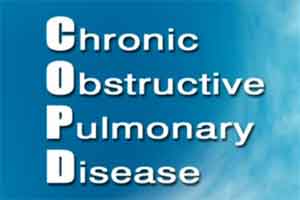- Home
- Editorial
- News
- Practice Guidelines
- Anesthesiology Guidelines
- Cancer Guidelines
- Cardiac Sciences Guidelines
- Critical Care Guidelines
- Dentistry Guidelines
- Dermatology Guidelines
- Diabetes and Endo Guidelines
- Diagnostics Guidelines
- ENT Guidelines
- Featured Practice Guidelines
- Gastroenterology Guidelines
- Geriatrics Guidelines
- Medicine Guidelines
- Nephrology Guidelines
- Neurosciences Guidelines
- Obs and Gynae Guidelines
- Ophthalmology Guidelines
- Orthopaedics Guidelines
- Paediatrics Guidelines
- Psychiatry Guidelines
- Pulmonology Guidelines
- Radiology Guidelines
- Surgery Guidelines
- Urology Guidelines
Azithromycin reduces treatment failure in acute exacerbations of COPD, finds clinical trial

Azithromycin may reduce attacks of acute exacerbations in COPD, finds a clinical trial.
According to a randomized, controlled trial, the antibiotic azithromycin may reduce treatment failure in patients hospitalized for an acute exacerbation of chronic obstructive pulmonary disease (COPD). The study has been published online in the American Thoracic Society’s American Journal of Respiratory and Critical Care Medicine.
Azithromycin is a macrolide-type antibiotic which is used to treat a wide variety of bacterial infections. Previous studies have shown that azithromycin prevents acute COPD exacerbations, but whether the antibiotic could reduce the need to intensify care of patients hospitalized for an exacerbation or improve their chances of not having another exacerbation once they left the hospital was unclear.
In “Azithromycin during Acute COPD Exacerbations Requiring Hospitalization (BACE): a Multicenter, Randomized, Double-blind, Placebo-controlled Trial,” researchers in Belgium report that adding a low dose of azithromycin to the medicines prescribed while in the hospital and continuing a low dose of the antibiotic for three months after hospitalization reduced treatment failure compared to standard of care alone. The researchers defined treatment failure as the need to intensify treatment with systemic corticosteroids and/or antibiotics, transfer the patient to the intensive care unit or readmit the patient to the hospital after discharge, and death from any cause.
Wim Jannssens, MD, PhD, senior study author, professor of medicine at KU Leuven and a pulmonologist at University Hospitals Leuven, said that the goal of the study was to test whether targeting the highest risk patients for a limited period of time, rather than using azithromycin widely as a chronic preventive treatment for COPD exacerbations, was beneficial to patients.
“We wanted to establish a new treatment option for acute exacerbations with hospitalization as current treatments are clearly insufficient,” he added. “Equally important, we wanted to see whether continuing azithromycin for a relatively short time after leaving the hospital could interrupt the vicious cycle of relapse, even after treatment withdrawal.”
The study enrolled 301 patients at 20 Belgian hospitals. Half the patients were given azithromycin, the other half a placebo, in addition to the medicines their physicians would normally prescribe to resolve the exacerbation. Patients in the azithromycin arm of the study received 500 mg/day for three days while hospitalized, and then received 250 mg twice weekly for three months once they left the hospital.
The study found that the rates of treatment failure were 49 percent for those in the azithromycin group vs. 60 percent in the placebo arm. Because the researchers did not reach their goal of 500 participants, the trial was underpowered to demonstrate statistical significance of its primary endpoint: time to treatment failure.
Those receiving the antibiotic spent 24 percent fewer days in the hospital and 74 percent fewer days in the ICU than those taking the placebo. Mortality among those in the azithromycin group was half of the placebo group: 2 percent vs. 4 percent.
These benefits appeared more pronounced among non-smokers. Current smokers experienced little or no benefit from low-dose azithromycin.
The researchers also studied the effects of withdrawing azithromycin at the end of three months and found that six months later the clinical benefits of the antibiotic were lost.
Although the study could not prove statistical significance of its primary endpoint, “a positive message of the trial is that our strategy reduced hospital time, days in the ICU and recurrent exacerbations in the most severe COPD group,” Dr. Janssens said, adding that a large phase 4 study with hospital readmission as the primary endpoint would be necessary before broad implementation of the current study’s findings.

Disclaimer: This site is primarily intended for healthcare professionals. Any content/information on this website does not replace the advice of medical and/or health professionals and should not be construed as medical/diagnostic advice/endorsement or prescription. Use of this site is subject to our terms of use, privacy policy, advertisement policy. © 2020 Minerva Medical Treatment Pvt Ltd